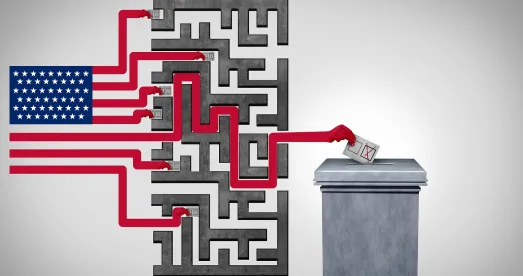Before adjourning its 2025 session, the New York State Legislature passed a bill that allows for state party committees to remove voters from their party. The measure, which was opposed by Republicans and supported by most Democrats in each chamber of the state legislature, is widely viewed as a legislative favor to the small but politically powerful Working Families Party.
Few New Yorkers — even those active in politics — are aware that county party leaders already possess the power to remove, or disenroll, a voter from the voter’s chosen political party. Though the procedure might be considered arcane, it is not merely theoretical. In recent years, local party officials have used it with increasing frequency, with varying results.
In 2021, for example, the Monroe County Conservative Party successfully disenrolled twenty-one voters in the Town of Rush. Party leaders alleged that these individuals, sympathetic to the Democratic Party, had enrolled as Conservatives to influence the party’s town primary election. A court found the party satisfied all procedural requirements and affirmed the expulsion of the voters from the Conservative Party. That decision was upheld by the Appellate Division, Fourth Department, in 2022.
A similar effort the following year in Erie County ended quite differently. There, the county Conservative chair sought to disenroll seventy-five voters in the Town of Evans — including a candidate for Evans Town Supervisor. That attempt failed for multiple reasons beyond the petitioners not making their case that the voters were out of sympathy with the principles of the Conservative Party. For instance, the court held that the ten-day statutory deadline for initiating a disenrollment proceeding means ten days before the start of early voting, not ten days before primary day. It also found the petitioners had waited too long to file their proceeding, invoking the doctrine of laches, and further concluded that service on several of the respondent-voters was defective.
Until now, the Election Law has required that disenrollment proceedings be conducted by a party’s county committee. But under the newly passed legislation, if a party has no organized county committee in a given county, the party’s state committee may appoint an individual or subcommittee to act in its place for purposes of disenrollment.
In practice, this change most clearly benefits the Working Families Party. The WFP, which has grown influential in recent election cycles through its support of progressive Democratic candidates in Democratic primary elections, has no county-level organizations. Without county committees, the party has lacked the ability to initiate disenrollment proceedings. This bill “fixes” that procedural limitation and empowers the state leadership of the WFP with a powerful new legal tool.
To be sure, disenrolling a voter is not easy. Party leaders seeking to remove a voter must meet procedural requirements, prove the voter is in fact disloyal, and persuade a court to order the enrollment cancellation. The process is time-consuming, expensive, and subject to judicial scrutiny. But by granting this power to state-appointed actors when no county committee exists, the new bill, should it be signed into law by Governor Hochul, is likely to lead to greater use by party leaders of this important political instrument.
Candidates, campaign operatives, party leaders, and election lawyers should anticipate a rise in disenrollment proceedings should the Governor sign the bill into law. Those seeking to initiate disenrollments, however, must understand that these proceedings can be resource-intensive and, maybe more importantly, politically sensitive. Due to the many procedural pitfalls that can arise in the course of disenrollments, they should not be undertaken by those with little background, knowledge, and experience in this area of law.
Assuming this bill becomes law, it will likely take some time to fully appreciate the practical political effects it has on Empire State politics. Party leaders will almost certainly take advantage of this new tool for enforcing party discipline, but how often it is used is anyone’s guess. Few, however, can deny that this seemingly minor change in the Election Law at least has the potential to have major political consequences.
All of the views and opinions expressed in this article are those of the author and not necessarily those of The National Law Review.




 />i
/>i
